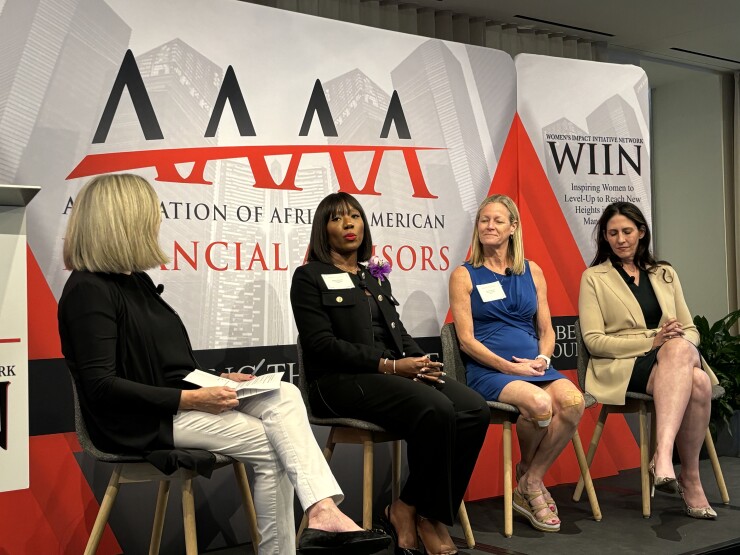Atricia Roberts first wanted to be a planner because of a financial advisor who "changed the trajectory" of her life by working with her family in the wake of a childhood tragedy, she said.
"I was motivated that I could do that kind of work for other people," Roberts, partner and chief operating officer with Rockville, Maryland-based advisory practice
Unfortunately, her experiences being left out of opportunities often afforded to men at a large wealth management company's branch suggested that "the business was not for me, it was not for people who looked like me," Roberts said. "It became such an emotional deterrent."
Identify Barriers to Entry for Women
In a discussion in front of dozens of female professionals in attendance, Roberts and three other executives whose success in the industry belies the severe underrepresentation of
"Think about that person who helped her," said the panel's moderator,
READ MORE:
Since fewer than a quarter
In fact, when Julie Ragatz, the vice president of next-gen and advisor development programs at Omaha, Nebraska-based
"What I started to see is that I wanted that answer to be different for other women," Ragatz said. "For me, it's about changing the perception of this business in the minds of young people I talk to."
Promote Flexible Work Policies
Part of altering those patterns means providing more flexibility for employees of any gender who are parents. Once Libet Anderson, the president of wealth management with Birmingham, Alabama-based
"I can't tell you how proud she is today," Anderson said. "We've got to give people room and give them space to be in this business and help them, lift them up."
READ MORE:
Anderson's remark drew a round of applause from the audience. Still, the demographics of the industry reminded Stone of the necessity of networking and sharing best practices between women navigating the field "along with all of the structural things that we need to continue to change," she said. She mentioned
"We need to carry this forward," Stone said. "We did not have a Black female CEO of a Fortune 500 company until 2009."
Create Leadership Opportunities for Women
For women aspiring to careers in the field, it's important to understand that "there's a spot for you in this business, we just have to figure out which one it is," Ragatz said. At the same time, she called for companies to be "willing to be self-critical," such as examining what went wrong when she wrote a job description for an internship at Carson Group that generated 96 male applicants and only four women among the group, she noted.
Without referring specifically to
"We're trying to do better just like everyone else," she said. "I think that's a culture where change can happen, even if it's not at a pace as fast as you might like it."
READ MORE:
Establish Mentorship Programs
Roberts is "100% convinced" that mentorship "is the way that we undo the system that was created around us," she said. "It was his coaching that gave me that confidence and that experience, and I think that's the way we can shift the dynamic about women in this industry."






